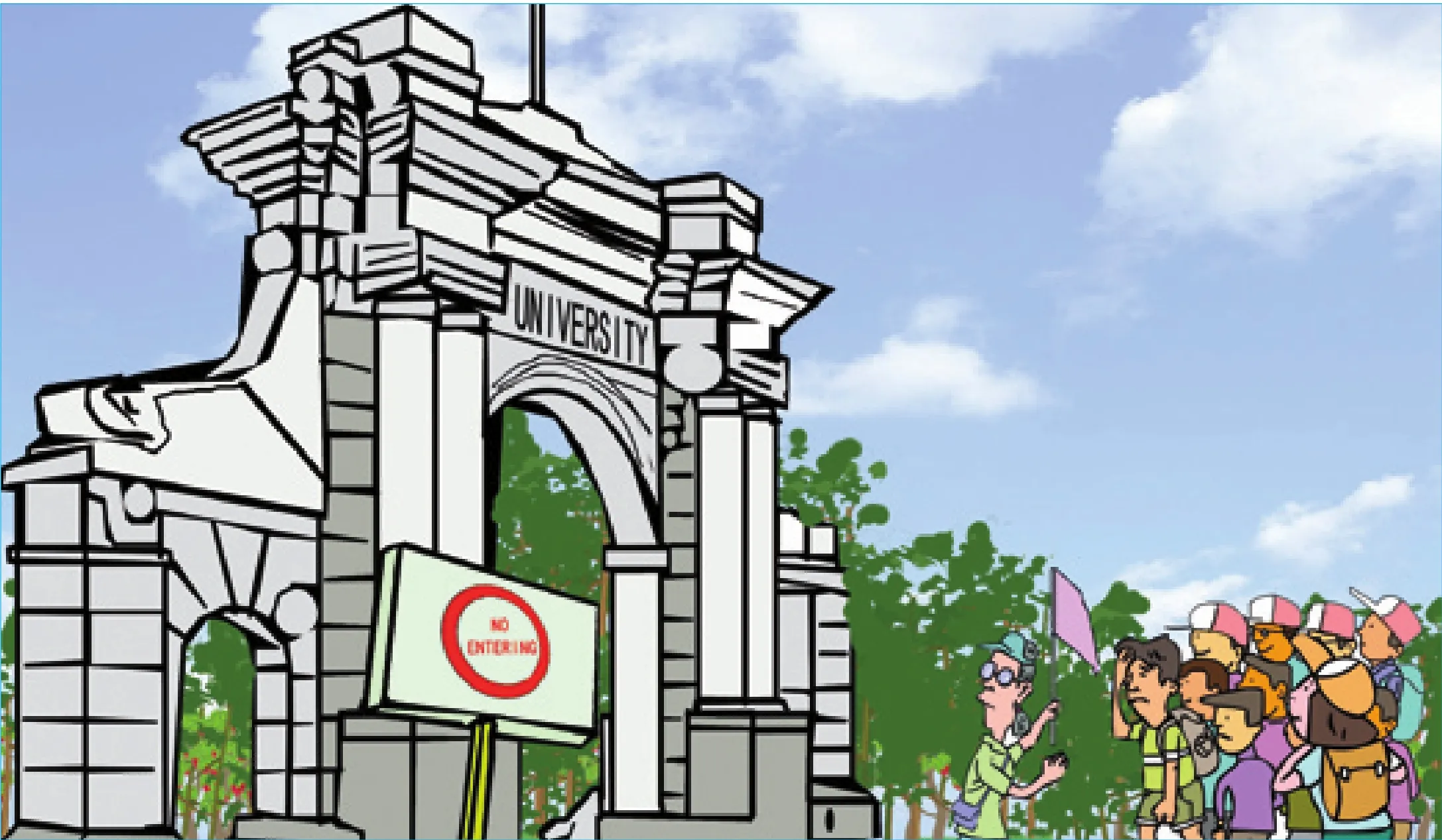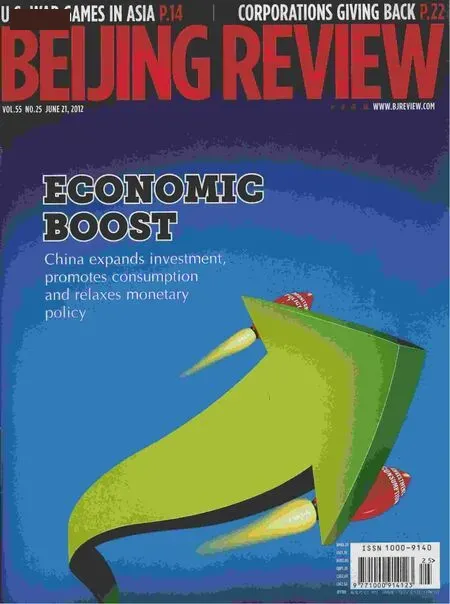Should Tourists Be Banned From Campuses?
Should Tourists Be Banned From Campuses?

LI SHIGONG
Xiamen University, one of the leading universities in China, began to ban tour groups from entering its campus on June 1. The notice of the university said that except for certain dining halls, most of the school’s cafeterias will not receive tourists or accept cash. However, individual tourists are still allowed to enter the campus after registration.
Located in Xiamen, southeast China’s Fujian Province, Xiamen University is widely recognized as one of China’s most beautiful campuses, making it a hot scenic spot in the city. But the swarm of tourists has also created many problems in the campus, such as garbage and noise, which affected the school’s teaching, research and students’ daily life.
Actually, Xiamen University is not the only prestigious university in China to be plagued by crowds of tourists. Statistics show that in the summer of 2011, Tsinghua University and Peking University received an average of 16,000 tourists a day. Peking University used to receive applications daily from more than 100 travel agencies for permission to visit the university.
In order to prevent the large crowds of tourists from affecting their campus environment and teaching order, universities have already taken measures. Peking University limits tourists to 5,000 per day, and Tsinghua University sets its open time to be between 8:30 and 16:30 during the peak tourism time.
The move of these universities has triggered heated debate. Supporters say that campuses are places for students to study and students need a tranquil environment. Too many tourists will inevitably affect students’studies and daily life. Thus, these schools’measures are understandable. However, opponents argue that universities are public places, and so banning tourists from campuses is a silly and lazy policy which shows that universities don’t want to spend too much time taking care of visitors. The following are excerpts of some opinions.
Supporters
Yang Qiufeng (www.cnhubei.com): Xiamen University is right in banning tour groups from entering its campus, which set a good example for other universities.
Nowadays, some travel agencies list prestigious universities as tourist sites. University students and teachers are greatly disturbed. Take Wuhan University in central China’s Hubei Province for example—the university is famous for its spring cherry blossoms and thus, when the flowers blossom, the campus always becomes overcrowded. Then the school decided to charge ticket fees, saying that the income would help the university to strengthen the management. This practice is unwise. To what extent can a 10-yuan ($1.6) ticket prevent people from entering the campus? How does the university spend their ticket income?
Compared with Wuhan University, what Xiamen University has done is much more acceptable. Tour groups are banned from entering the campus, but individuals are still permitted to enter. If you want to feel the unique atmosphere of this beautiful university, you can go by yourself, instead of joining any tourist groups. Thus, students’ normal life will not be interrupted and the school doesn’t need to worry about how to keep the campus in order.
Universities are not scenic spots, but places of learning. A peaceful environment for teaching and academic work is the basic requirement. Visitors are free to appreciate the beauty of this university, but the precondition is that they should not disturb those who are studying and teaching there. Therefore, Xiamen University’s practice is understandable and acceptable.
Hu Shixin (www.gmw.cn): Due to prestigious universities’ fame and charm, tourists hope to appreciate the academic and historical atmosphere of these institutions. But the universities find themselves unable to accommodate and cope with the inflow of so many tourists on campus. The increase of tourists affects the normal operation of universities. Apart from the fact that the campus environment is damaged, other resources of universities are partly occupied by tourists, such as the dining halls. Xiamen University is trying to keep a balance between meeting tourists’ demands and maintaining the school’s order. It bans tour groups but is still open to individual tourists.
Tourists should also understand the difficulty the universities face. When visiting universities, they should try their best to protect the campus environment and not to interrupt the schools’ normal order.
When the two sides learn to consider the issue from each other’s perspective, the problem will be resolved and campus tours will no longer be a problem.
Chang Dadui (Foshan Daily): I support Xiamen University’s ban on tour groups. Universities are supposed to be a quiet place for academic work. Too many tour groups lead to noise and other problems. Meanwhile, students’ safety is also under threat in such a crowded and disordered environment.
Opponents
Li Liyan (The Beijing News): The ban of Xiamen University aims to prevent tourists from damaging the campus environment and squeezing resources, so that students’ daily studies and life won’t be interrupted.
Such bans are often applauded by students and teachers but attacked by travel agencies and tourists. People all tend to think about the problem from their own perspectives. The important thing is how to reach a balance between the universities and tourists.
Universities should stop regarding themselves as ivory towers immune from social influences. As public institutions, they are obligated to be open to society. University campuses are special resources. It’s unwise to simply reject tourists.
Apart from the “bans,” there should also be “guiding.” It’s necessary for education authorities and relevant departments to cooperate with these universities, in order to properly and moderately make use of university resources. Thus, these prestigious universities can play a positive role in improving the public’s cultural and academic level.
Wu Binbin (www.xinhuanet.com): It’s better for universities to moderately open their tourism resources than to ban tourists outright.
Campus tourism has pros and cons, and so how to balance tourism and academic work is key. Here, we stress moderation. Tourists should be allowed on campuses but campus resources must not be over occupied by tourist groups. If schools can properly make money from tourism to supplement their daily expenses, it’s a win-win game.
If university tours develop into a good project, students can have more opportunities to make money and even start their own businesses. Tourists will surely spend money on campus tours. Besides, students can also serve as tour guides to present schools’ culture and history to the visitors. Tourism is in nature an economic activity. Universities can charge fees for campus tours, and this to some extent helps to improve the school’s economic situation.
Universities’ fame and influence will be further expanded once campus tours are well developed. This is probably what all universities and colleges hope to see. With the expansion of college recruitment, the competition among universities is increasingly fierce. Thus, making themselves known and appreciated by more people will be very important for universities.
Meanwhile, as a kind of public education resource, apart from educating students, universities also have certain social responsibilities. By opening to tourists, universities can help ordinary people pick up some scientific and cultural knowledge.
Particularly, universities’ resources are unused in holidays,. At that time, it’s a good idea to develop these prestigious universities into education bases, receiving visiting groups and tourist groups.
Daoke KoKo (www.fjsen.com): It’s unwise for universities to ban tourists from entering the campus just because the schools find it difficult to manage the situation. Ordinary people also have the right to visit and appreciate prestigious universities. Universities are supposed to be tolerant and open to the outside world.

